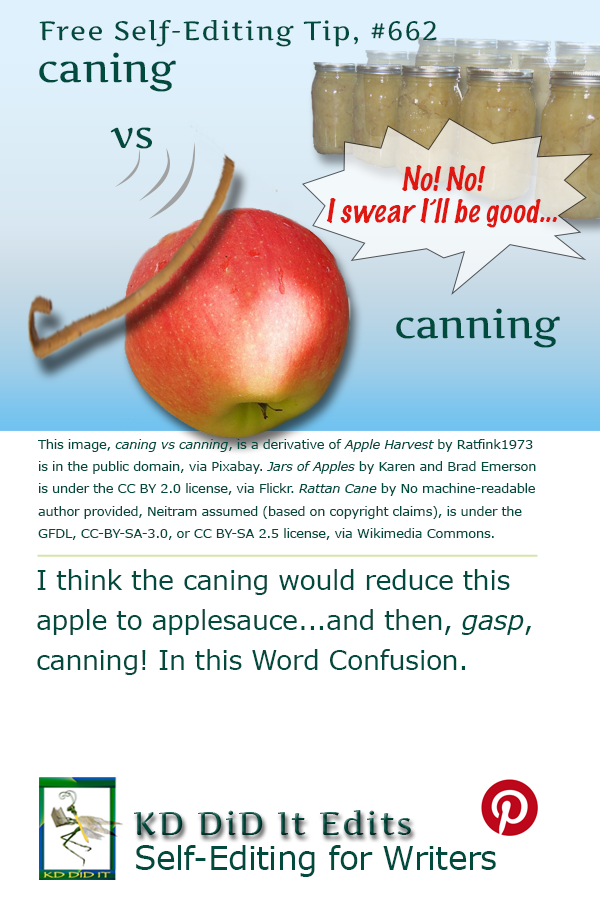I wouldn’t be caning those canning jars, if I were you. They’re liable to break, and then you’ll have a mess.
Okay, so it’s not fair of me to use canning as an adjective, but it does grab the mind, doesn’t it?
As with any verb that goes into action, adding an -ing or -ed determines if it’s a current action or in the past. The trick to correct spelling is to remember that any verb ending in an e must remove the e and then add the -ing or -ed.
A verb that ends in a consonant, in this case the n in can, doubles up on the consonant before adding the -ing or -ed, i.e., canning or canned. And I’ve no problem with either, as long as I get to sample what’s been canned *grin* Oomph, unless I’m the one being canned!
You may also want to explore other can”ned” posts: “Can versus May” explores the permissive aspect of can, “Can versus Ken” is all about the ability, and/or the “Might’a not be a Could’a, Would’a, Should’a” issues.
Word Confusions…
…started as my way of dealing with a professional frustration with properly spelled words that were out of context in manuscripts I was editing as well as books I was reviewing. It evolved into a sharing of information with y’all. I’m hoping you’ll share with us words that have been a bête noir for you from either end.
If you found this post on “Caning versus Canning” interesting, consider tweeting it to your friends. Subscribe to KD Did It, if you’d like to track this post for future updates.
| Caning | Canning |
|---|---|
| Credit to: Apple Dictionary.com | |

ACEH Caning, 19 September 2014, is courtesy of Voice of America and in the public domain, via Wikimedia Commons. — A caning sentence being carried out in Banda Aceh, Indonesia. |
Grow More…Can More…in ’44 is in the public domain, via Wikimedia Commons. — Being frugal, canning food, was a common theme in the war years. |
| Part of Grammar: | |
| Root word: cane
Noun; Verb, transitive Plural for the noun and third person present verb: canes |
Root word: can
Noun; Verb, modal Past tense (as a modal verb): could Plural for the noun and third person present verb: cans |
| Noun: The focus in this post is on the verbal -ing (-ed) ending Verb, transitive: To furnish or make with cane |
Noun and Verb, modal: The focus in this post is on the verbal -ing (-ed) ending Verb, transitive: [North American; informal] Dismiss someone from their job
|
| Examples: | |
| They still use caning as a punishment in Indonesia.
When caning someone, the hits are referred to as strokes or cuts. Ouch “The 19-year-old American who was caned in Singapore for vandalism said today that the bleeding it caused was ‘like a bloody nose’ (“U.S. Student Tells of Pain Of His Caning In Singapore“, New York Times, Archives 1994).” People protested outside the Banda Aceh mayor’s office on Thursday, saying that “hiding the canings will reduce the deterrent effect”. Their company takes caning to a fine art. Chair caning is an ancient craft. |
Verb, transitive: Mom’s canning strawberry jam this weekend. We canned applesauce and pickled beets yesterday. He was canned because of a fight over promotion. The editorial team was so disappointed that they canned the project. |
| Derivatives: | |
| Adjective: canelike, cany, uncaned Noun: caner Verb, transitive: recane, recaned, recaning |
Adjective: can-do Noun: canner |
| History of the Word: | |
| Late Middle English from Old French, via the Latin from the Greek kanna, kannē and is of Semitic origin. | Old English canne is related to the Dutch kan and the German Kanne and is either of Germanic origin or from the late Latin canna. |
C’mon, get it out of your system, bitch, whine, moan…which words are your pet peeves? Also, please note that I try to be as accurate as I can, but mistakes happen or I miss something. Email me if you find errors, so I can fix them…and we’ll all benefit!
Pinterest Photo Credits:
Apple Harvest by Ratfink1973 is in the public domain, via Pixabay. Jars of Apples by Karen and Brad Emerson is under the CC BY 2.0 license, via Flickr. Rattan Cane by No machine-readable author provided, Neitram assumed (based on copyright claims), is under the GFDL, CC-BY-SA-3.0, or CC BY-SA 2.5 license, via Wikimedia Commons.


